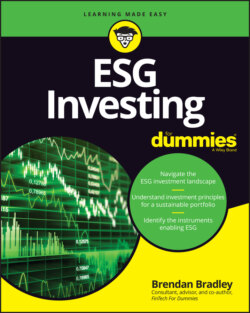Читать книгу ESG Investing For Dummies - Brendan Bradley - Страница 34
The 21st century
ОглавлениеWith the arrival of the 21st century, the world’s focus on responsible investing has fully incorporated issues around global warming, diversity and inclusion, and associated corporate governance principles in what people know as ESG:
2000: Norway’s Government Pension Fund and the largest pension fund in the United States, CalPERS (the California Public Employees’ Retirement System), committed to 100 percent integration of sustainability principles over 15 years.
2006: The Principles for Responsible Investment (PRI; see Chapter 1), a set of six investment principles encouraging ESG matters to be incorporated into investment practice, were launched by the United Nations. The principles were developed “by investors for investors.” They are voluntary principles but have attracted more than 3,000 signatories from over 60 countries, representing over US$100 trillion.
2009: The Global Impact Investing Network (GIIN), a not-for-profit organization devoted to increasing the effectiveness of impact investing, was launched.
2011: The Sustainability Accounting Standards Board (SASB; see Chapters 1 and 15), a non-profit organization, was founded to develop sustainability accounting standards.
2012: A new edition of International Finance Corporation’s (IFC’s) Sustainability Framework, which includes the Environmental and Social Performance Standards defining responsibilities for managing environmental and social risks, was published.
2015: The United Nations (UN) Sustainable Development Goals (SDGs) were established. They serve as a blueprint for significantly changing the world by ending global poverty, safeguarding the planet, and ensuring prosperity for all by 2030. Also, 195 countries adopted the first-ever universal, legally binding global climate deal with the Paris Agreement (a much more extensive follow-up to the original Kyoto Protocol in 1997). For more information on the SDGs, see Chapters 1 and 15.
2016: The Global Reporting Initiative (GRI) converted its reporting guidance to the first global standards for sustainability reporting, featuring a modular, interrelated structure representing global best practices for reporting on economic, environmental, and social impacts. See Chapter 1 for details.
2017: In a new European Union (EU) Pensions Directive, member states have an obligation to “allow Institutions for Occupational Retirement Provisions (IORPs) EU pensions to take into account the potential long-term impact of investment decisions on ESG factors.”
2017: The Task Force on Climate-Related Financial Disclosures (TCFD) published its recommendations on climate disclosures. They were based around four thematic areas that represent core elements of how organizations operate: governance, strategy, risk management, and metrics and targets. These thematic areas are designed to interlink and inform one another. (For more information, see
www.tcfdhub.org/recommendations/.)2019: This year marks the tenth-year anniversary of the United Nation’s Sustainable Stock Exchange initiative, which is committed to promoting debate about ESG issues among issuing companies and investors. Most global stock exchanges are part of the initiative.
2020: The final report on EU taxonomy was published (developed by the Technical Expert Group [TEG] on Sustainable Finance), which contains recommendations on the overarching design of the taxonomy, and guidance on how companies and financial institutions can make disclosures using the taxonomy to improve the coverage of disclosed data. See Chapter 1 for more information.
2020: The COVID-19 crisis provoked a shift in investor perception of social factors, which have a critical and constructive impact on long-term value creation and risk mitigation. The Black Lives Matter demonstrations also highlighted interconnections in the way companies approach social issues, including treatment of employees and inequalities, in their long-term sustainability strategy. These events, allied to ongoing environmental issues, will be a game changer for ESG investing.
